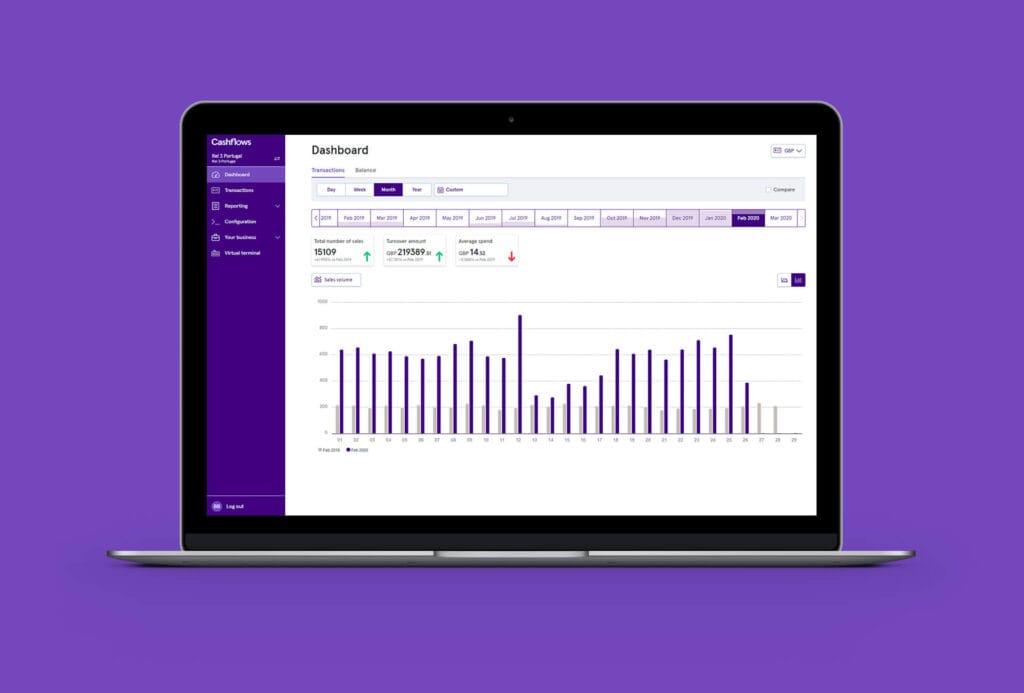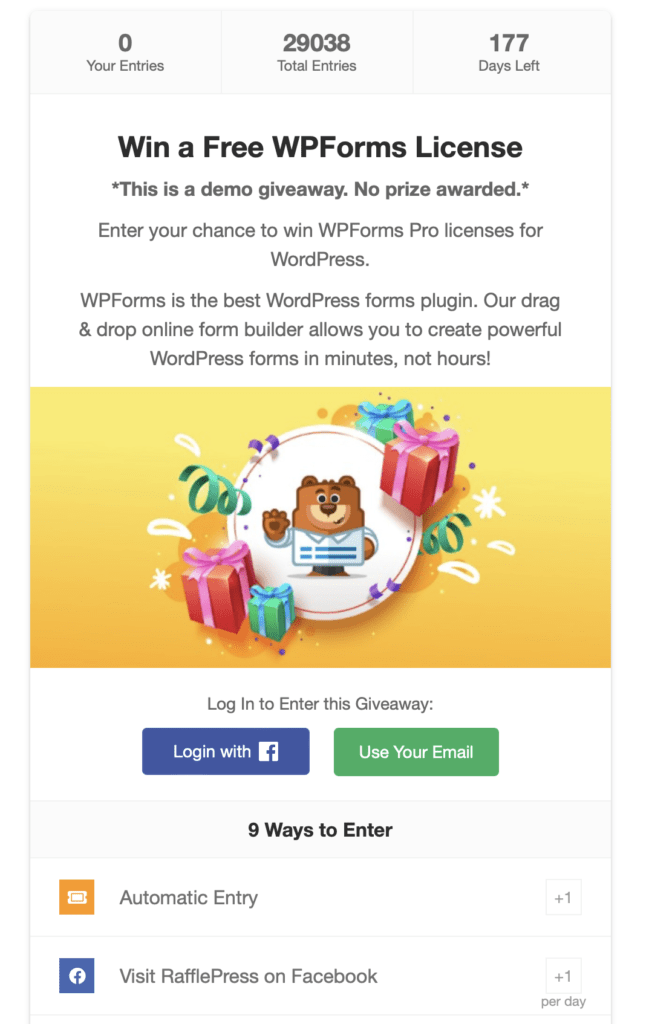We help you create a fully functional competition business in the UK
We don’t just help you create a fully working website, we also:
- Advise on branding, look and feel of your competition site
- Help pick a winning niche
- Create a powerful, fast and responsive system
- Give advise on how to stay legal
- Create features like instant wins, site credit, sales tactics
- Advise on the type of giveaways to do, including help with pricing, ticket min and max
- Provide a full support package
Get in touch here for more info about how to make a competition/raffle website today.
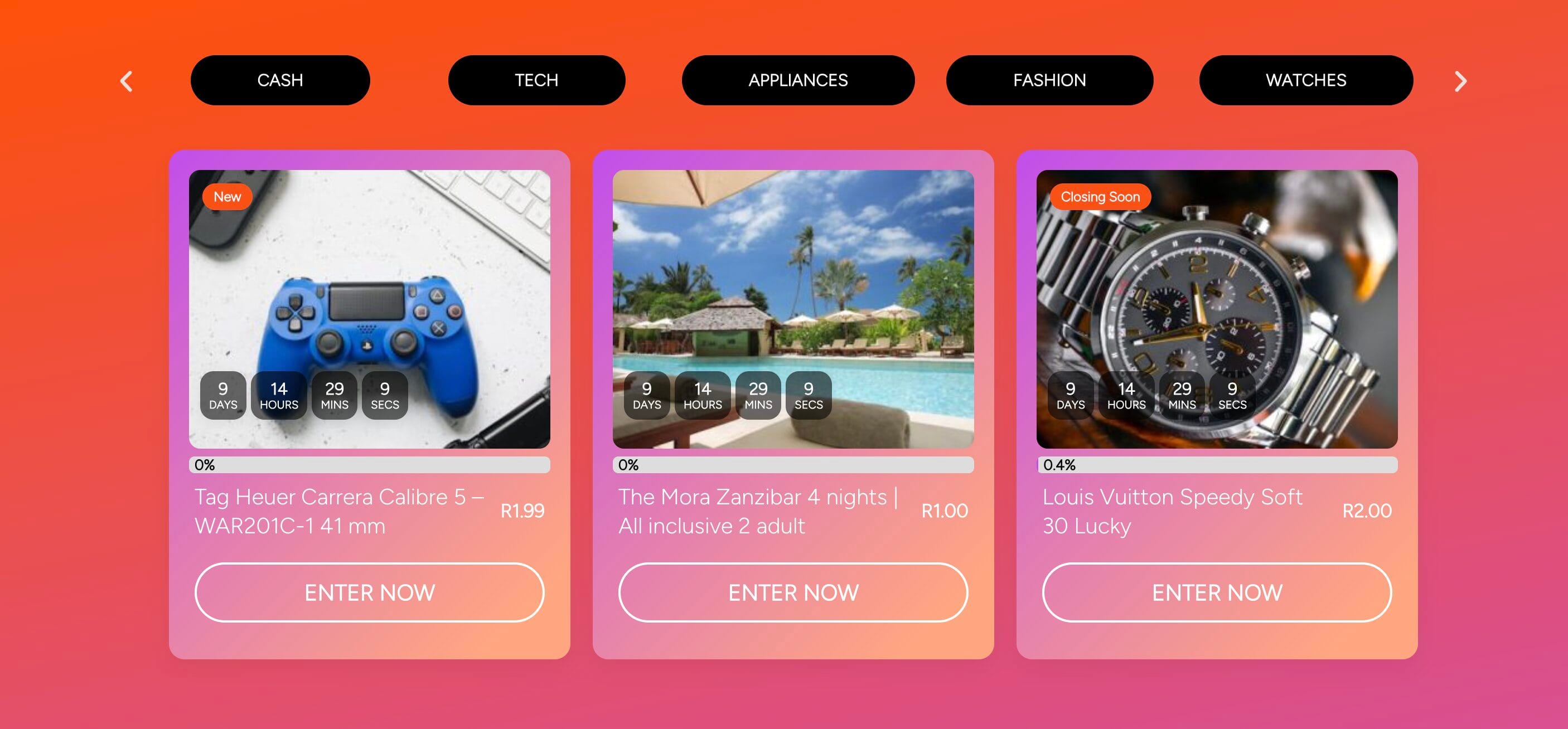
Are you looking to start a competition or raffle website, or maybe you have a business already and want to expand it. A competition website allows you to sell tickets online and give away prizes. This blog post talks about how you can start a successful competition website.
- Start selling tickets and making money in a few days
- Set up competitions and run the website yourself
- We create a stunning, unique website just for you
- Sell tickets for any kind of competition, including free giveaways, cash, cars, holidays, and anything else
- Instant win functionality is available
- User wallets, sign up bonuses, instant wins goes to wallets
- All our sites follow the law and regulations
Some of our successful competition/raffle website builds
When creating competition websites we always take the clients needs on board, we create websites specifically form them and give full tutorials on how to use the site. We also offer full support.
Prizes Galore
From £0 to £56k+ a month in sales within 3 months. Using traffic from a Facebook community

The Vintage Watch Draw
From £0 to £40k+ month in sales within 3 months. Using Instagram and Facebook marketing

Bonnie Competitions
From £0 to £60k+ a month in sales after 6 months. Using Facebook communities and marketing

We can create a fully functioning competition website with all the features you need, get in touch today.
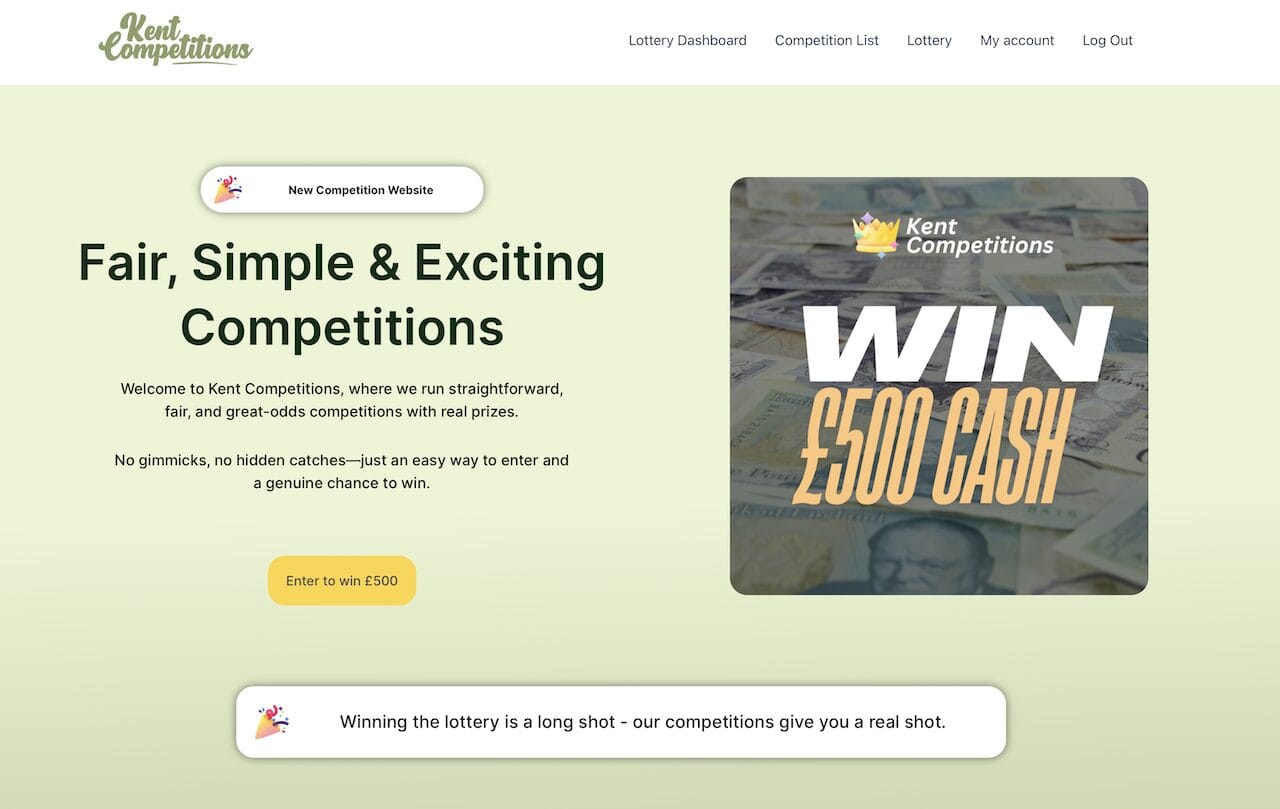
Raffle and competition websites are becoming more popular each year. There are all kinds available with various pricing, from winning millions to luxury houses to custom camper vans. Many of these raffle websites have a fairly high ticket price compared to the lottery. One of the biggest new players in the online raffle/competition industry is Omaze, which offers players a chance to win a luxury house somewhere in the UK or Europe. Ticket prices start from £10, but you can even subscribe every month.
We can help you create your own competition/raffle website, where you can sell tickets, generate ticket numbers, give away prizes, and have the system automatically send emails to winners, giveaway instant wins, website credit and more.
Get in touch today to start your own successful competition site like we have done for many others.
How to start a raffle website
Quick links
- Step-by-step guide to the creation of a competition website
- Step 3: Promoting Your Competition and Selling Tickets
- Why is a raffle or competition website a good business model?
- What are the legal requirements for running a competition site?
- Using WordPress to make a competition or raffle website
- Create a raffle website or competition website
Looking to create your own competition website?
We specialise in creating high-quality competition websites and can guide you through every step of the process. Get in touch today for a fast, no-obligation quote!
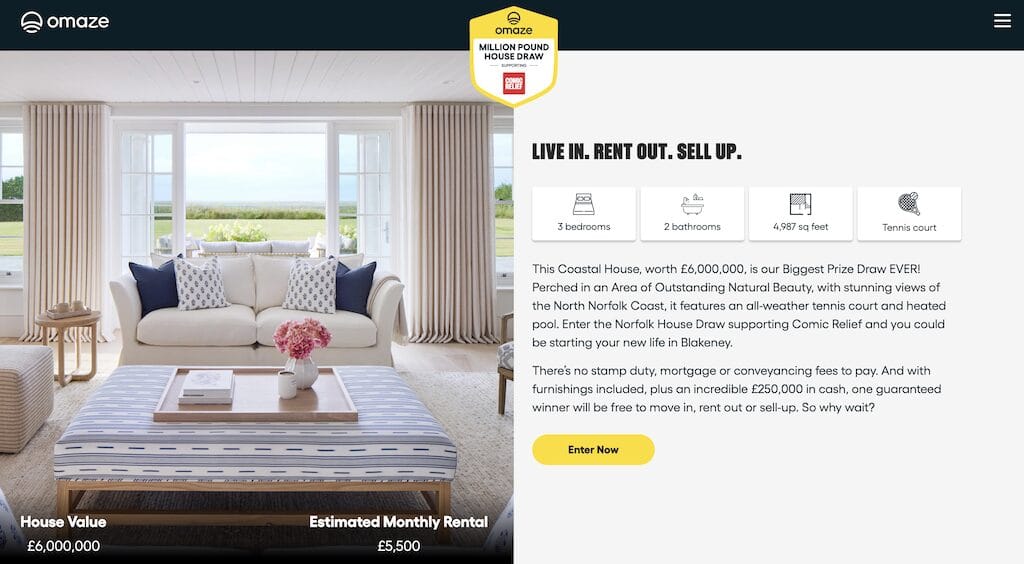
We specialise in making competition websites so get in touch today for a quote!
Here at Developer Rocket we make websites for Raffle and competition businesses all around the UK. We can get your business up and running or improve what you currently have. Get in touch here.
Do I need a gambling license to run a competition website?
No you don’t according to the official gambling commision website you do not need a gambling license. You can run a competition website as long as they are being ran in a way that meets the requirements of the Gambling Act 2005 (opens in new tab). Please read the official requirements here.
Step-by-step guide to the creation of a competition website
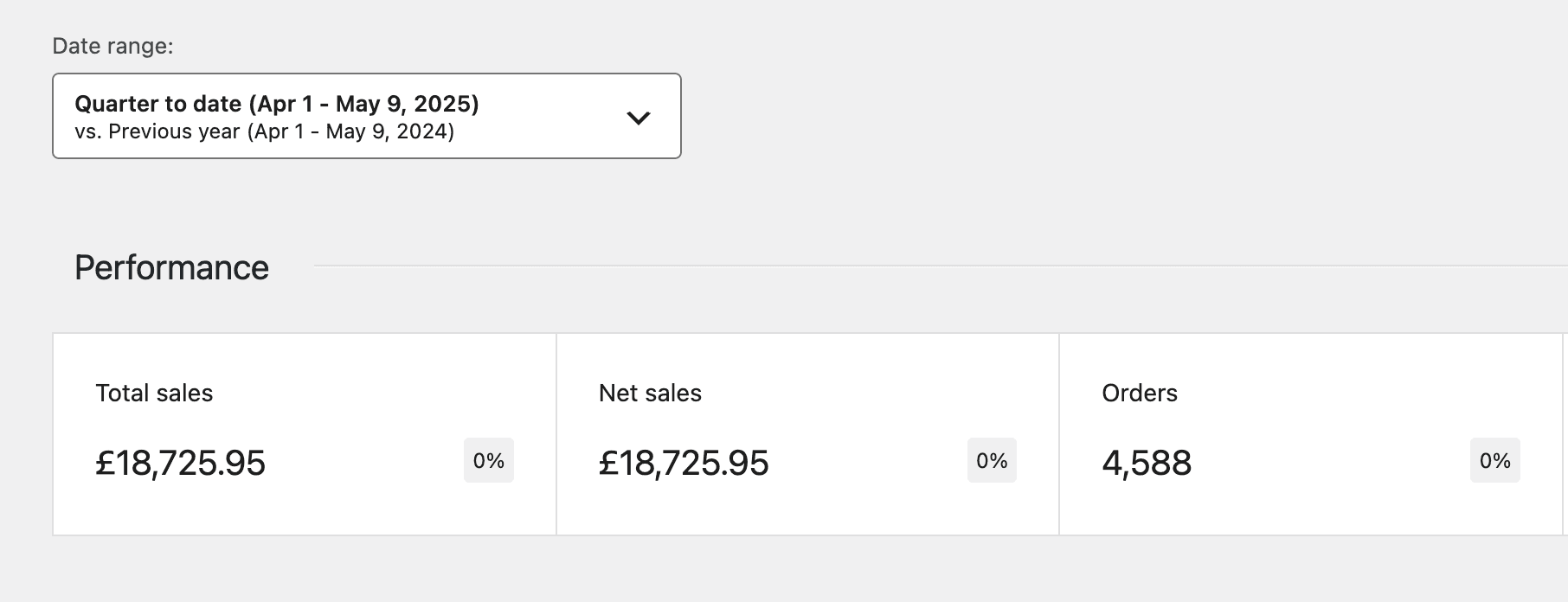
Step 1: Know Your Goals and Understand What’s Involved
Before diving into the creation of a competition website, it’s essential to define your goals and understand the process from start to finish. This step forms the foundation of your website’s success. Here’s what you need to consider:
Define Your Goals
Ask yourself:
- What is the purpose of your competition website?
Are you looking to generate leads, grow your email list, increase brand awareness, or sell products? Knowing your primary objective will guide every decision you make. - Who is your target audience?
Consider who you want to attract to your site. Are they tech-savvy young adults, busy parents, or niche hobbyists? Tailoring your website to their preferences will enhance its appeal. - What type of competitions will you run?
Will you focus on giveaways, skill-based contests, raffles, or quizzes? Different competition formats require different features and legal considerations. - What do you want participants to do?
Define the actions participants must take to enter. For example, they might need to sign up, share your competition on social media, or make a purchase to qualify.

Understand the Requirements of your competition site
Running a competition website involves more than simply putting up a page and waiting for participants to join. You need to consider:
- Legal and Compliance Issues
Check the legal requirements in your region. In some areas, lotteries and raffles may require a license, while others have strict rules about promoting competitions. Ensure you’re aware of data protection laws (like GDPR in Europe) if you’re collecting personal information. - Costs and Budget
Factor in website development costs, hosting, marketing, and prize acquisition. If you’re offering high-value prizes, ensure the potential return on investment is worth it. - Technical Features
What functionality does your website need? Some common requirements include:
- Entry forms
- Payment gateways (if participants need to buy tickets or make a purchase to enter)
- Countdown timers
- Automated winner selection
- Social sharing integrations
- Prizes and Incentives
The prize is the main attraction for your audience. Choose something desirable and relevant to your target demographic. Whether it’s cash, tech bundles, or experience packages, your prize needs to excite your audience and encourage participation. - Marketing and Promotion
Plan how you’ll drive traffic to your website. Social media, email campaigns, influencer collaborations, and paid ads can all play a role in promoting your competition.
By setting clear goals and understanding what’s involved, you’ll be better prepared to build a competition website that achieves your objectives and engages your audience. With this foundation in place, you’re ready to move on to planning the structure and design of your site.
Step 2: Building Your Website and Setting Up a Payment Gateway
Once you’ve established your goals, the next step is to create your competition website and integrate a secure payment gateway. Here’s a guide to ensure your website is functional, user-friendly, and capable of handling transactions seamlessly.
Building Your Competition Website
Creating a professional and engaging website is essential for attracting participants and managing your competition effectively.
- Choose a Platform
- User-Friendly Options: Platforms like Shopify or WordPress with plugins such as WooCommerce are ideal for beginners. They offer pre-built templates and customization tools.
- Custom Development: If you need advanced features or a unique design, consider hiring a web developer for a custom-built solution.
- Design with Purpose
- Keep It Simple: A clean, easy-to-navigate design ensures users can quickly find information about the competition, prizes, and how to enter.
- Highlight the Prize: Use eye-catching images and bold headlines to showcase the prize. Make it the focal point of your homepage.
- Add Trust Signals: Include testimonials, past winners (if applicable), and a secure site seal to build credibility.
- Essential Features
- Entry Form: Create a simple, mobile-friendly form where users can enter their details or purchase entries.
- Countdown Timer: Add urgency by displaying the time remaining until the competition closes.
- FAQs Section: Answer common questions about the competition, rules, and prizes.
- Terms and Conditions: Clearly outline the rules of participation to avoid disputes.
- Mobile Optimization
Ensure your website is responsive and looks great on mobile devices. Many participants will access your site from their phones.
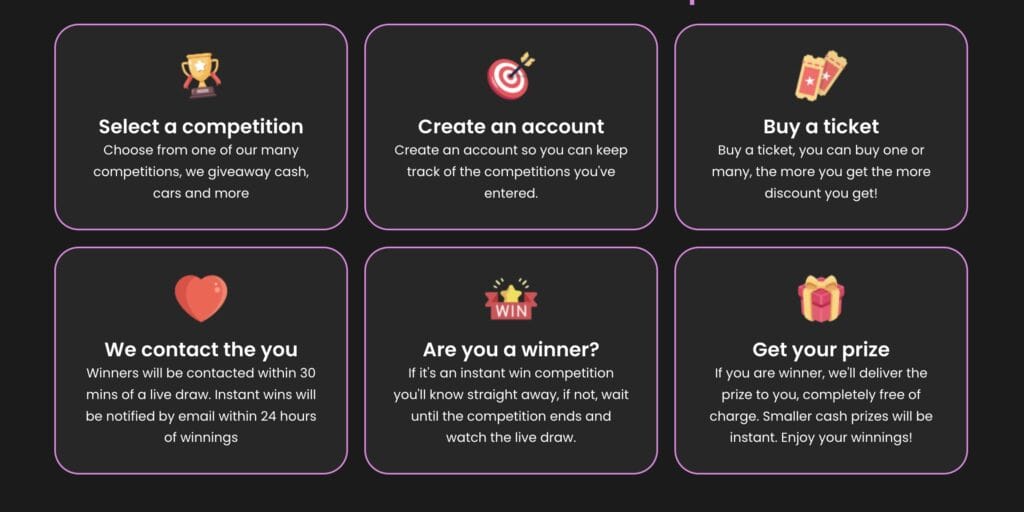
Setting Up a Payment Gateway for your competition website
Since running a competition website often involves elements that are regulated as gambling, standard payment gateways like PayPal or Stripe typically cannot be used. Instead, you’ll need a specialized payment gateway that supports competition or prize-based transactions and complies with the associated legal requirements.
1. Choose a Suitable Payment Gateway
Look for payment providers experienced in handling competition, raffle, or prize-draw websites. Examples include:
- Cashflows
- Trust Payments
- Nochex
These gateways are accustomed to working within the regulatory frameworks surrounding competitions and lotteries.
2. Understand the Compliance Requirements
Before integrating a gateway, ensure you meet all necessary regulations in your region:
- Licensing: If your competition qualifies as a lottery, raffle, or gambling activity, you may need a license.
- KYC (Know Your Customer): Many specialized gateways will require documentation to verify your business and the nature of your competition.
- Terms and Conditions: Clearly state the rules for your competition, including entry costs, eligibility, and prize details.
3. Integration with Your Website
Most specialized gateways provide tools or APIs to integrate their payment systems into your website.
- If you’re using a platform like WordPress or Shopify, you may need a plugin or custom development to support these payment providers.
- Work with your payment gateway’s technical support team to ensure a smooth setup.
4. Offer Multiple Secure Payment Options
Although your options are limited compared to standard payment gateways, many specialized providers still support common payment methods such as:
- Debit and credit cards
- Bank transfers
- Digital wallets (where allowed)
5. Transaction Fees and Processing Times
Specialized payment gateways may have higher transaction fees due to the increased risk associated with gambling-related activities. Factor these costs into your competition entry pricing to ensure profitability.
6. Security and Data Protection
Protect participants’ payment information by implementing the following:
- SSL Encryption: Ensure your site is secure with HTTPS.
- PCI Compliance: Your payment gateway should adhere to the Payment Card Industry Data Security Standard (PCI DSS).
7. Automated Confirmation and Ticketing
Once a payment is processed, your website should:
- Automatically confirm the entry via email.
- Issue a receipt or ticket number as proof of entry.
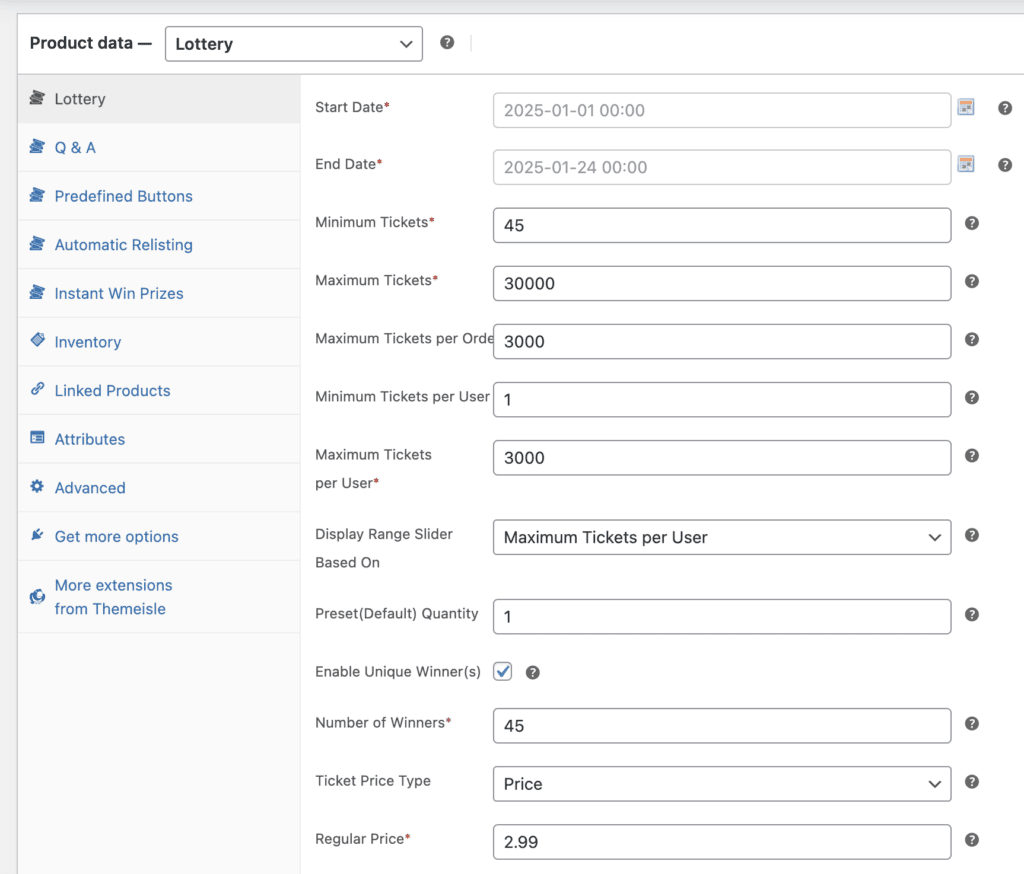
8. Test Thoroughly
Before going live, rigorously test the payment system to confirm:
- Payments are processed correctly.
- Notifications and receipts are issued without errors.
- Refund policies, if applicable, are clear and functional.
Using a specialized payment gateway ensures your competition website operates legally, builds trust with participants, and processes transactions securely.
Testing Before Launch
Before you go live, test every aspect of your website, including:
- The entry process
- Payment functionality
- Mobile responsiveness
- Email notifications
By focusing on these critical elements, you’ll create a polished, professional competition website that not only attracts participants but also ensures a smooth and secure experience for everyone involved.
Are you looking to launch your own competition website? We are currently selling a pre-built competition which you can buy for £249. This comes with everything you need to start your own competition website. This will save you thousands in development costs, so click here to buy it, make sure you read all the description! You can also buy it here on Gumroad
How to start a competition business
Step 3: Promoting Your Competition and Selling Tickets
With your competition website live and your payment gateway set up, the next crucial step is promoting your competition and driving ticket sales. A well-executed marketing strategy can make the difference between a successful campaign and a lacklustre one. Here’s how to effectively spread the word and boost ticket sales.
Read more about how to market your competition website in our blog post: How to market and sell more tickets on your competition website.
1. Build Buzz with a Pre-Launch Campaign
- Teasers on Social Media: Share sneak peeks of the prize, countdowns, and hints to create anticipation.
- Email Marketing: Send an announcement to your email list with exclusive early access or discounts for first-time participants.
- Landing Page Sign-Ups: Before the competition officially launches, create a landing page where users can sign up for updates and notifications.
2. Use Social Media to Your Advantage
Social media is one of the most effective ways to promote your competition and reach your target audience.
- Create Eye-Catching Posts: Use high-quality images or videos of the prize and emphasize the excitement of winning.
- Run Paid Ads: Platforms like Facebook, Instagram, and TikTok offer targeted advertising options that let you reach specific demographics.
- Leverage Stories and Reels: Short, engaging content like Instagram Stories or TikTok videos can grab attention quickly.
- Encourage Sharing: Create shareable content and offer incentives like bonus entries for participants who share the competition with their followers.
3. Collaborate with Influencers
Partner with influencers or bloggers in your niche to expand your reach. Look for influencers whose audience aligns with your target demographic. They can promote your competition through:
- Sponsored posts
- Live streams
- Giveaways that include free entry tickets
4. Utilise Email Marketing
If you have an existing email list, this is the perfect time to activate it.
- Announce the Competition: Use a compelling subject line and highlight the prize to grab attention.
- Send Reminders: As the competition progresses, remind your subscribers about the deadline and any special promotions.
- Segment Your Audience: Tailor messages to specific segments, such as previous participants or those who’ve shown interest but haven’t entered yet.
5. Optimize Your Website for Conversions
Make it as easy as possible for visitors to buy tickets or enter the competition.
- Prominent Call-to-Actions: Use bold, clear buttons that direct users to the ticket purchase or entry form.
- Highlight Urgency: Display a countdown timer and remind users of limited ticket availability.
- Mobile-Friendly Design: Ensure your site is fully optimized for mobile, as many participants will enter via their smartphones.
6. Offer Early Bird Discounts or Incentives
Create a sense of urgency and encourage early ticket sales by offering:
- Discounted Pricing: Reduced prices for early entries.
- Bonus Entries: Additional chances to win for early participants.
7. Leverage Referral Marketing
Encourage participants to spread the word by offering rewards for referrals. For example:
- Bonus Tickets: Give participants extra entries for every friend they refer.
- Exclusive Rewards: Offer discounts or special perks for top referrers.
8. Run Paid Advertising Campaigns
Invest in paid ads to expand your reach:
- Search Engine Ads: Use Google Ads to target keywords like “win a [prize]” or “competition to win [prize].”
- Social Media Ads: Target specific demographics based on age, interests, location, and behavior.
- Retargeting Campaigns: Show ads to people who visited your website but didn’t complete their entry.
9. Track and Adjust Your Campaigns
Monitor the performance of your promotions using tools like Google Analytics and social media insights. Identify what’s working and adjust your strategy to focus on the most effective channels.
10. Build Trust and Excitement
- Show Social Proof: Share testimonials, reviews, and participant numbers to build credibility.
- Celebrate Milestones: Announce ticket sales milestones or engage with participants through live updates and Q&A sessions.
By combining these strategies, you can effectively promote your competition, maximize ticket sales, and build excitement that keeps participants coming back for future campaigns.
Step 4: Tracking the Results of Your Competition
Once your competition is live and tickets are selling, it’s essential to track and measure your results to understand the performance and effectiveness of your campaign. This step allows you to identify what’s working, what isn’t, and how you can improve future competitions.
1. Monitor Key Metrics
Track the following metrics to gauge the success of your competition:
- Ticket Sales: How many tickets have been sold? Compare this to your initial targets.
- Website Traffic: Use tools like Google Analytics to monitor visits to your competition website. Pay attention to:
- Total number of visitors
- Bounce rate (visitors who leave without interacting)
- Average session duration
- Conversion rate (percentage of visitors who buy tickets or enter)
- Social Media Engagement: Measure likes, shares, comments, and clicks on your promotional posts to see how your content is resonating with your audience.
- Referral Sources: Identify where your traffic is coming from, such as social media, email campaigns, ads, or organic search.
- Ad Performance: If you’re running paid ads, analyze impressions, clicks, click-through rates (CTR), and return on investment (ROI).

2. Track Email Campaigns
If you’re using email marketing, monitor metrics like:
- Open rates: How many people are opening your emails?
- Click-through rates: Are recipients clicking on your competition link?
- Unsubscribes: If many people are unsubscribing, it may indicate issues with your content or frequency.
3. Set Up Conversion Tracking
Ensure you’re tracking every step of the user journey, from visiting your site to completing a ticket purchase.
- Use tools like Google Tag Manager to set up conversion tracking on your website.
- If you’re running Facebook or Instagram ads, use their pixel tracking tools to measure conversions directly from social media.
4. Gather Participant Feedback
Collect feedback from participants to understand their experience:
- Send a follow-up survey after the competition asking about their experience with the website, payment process, and overall engagement.
- Use this information to improve user experience and build loyalty for future competitions.
5. Monitor Trust Signals
Building trust with your audience is crucial for repeat success. Keep an eye on:
- Positive reviews or testimonials
- Increased social media followers or engagement
- Word-of-mouth referrals
6. Assess ROI (Return on Investment)
Calculate your ROI to determine if the competition was financially successful:
- Revenue Generated: Total ticket sales and any additional income.
- Expenses: Include costs for web development, payment gateway fees, advertising, prizes, and marketing.
- ROI Formula: ROI=(Revenue−Expenses)Expenses×100ROI = \frac{(Revenue – Expenses)}{Expenses} \times 100
7. Adjust Your Strategy for Future Competitions
Use the data you’ve gathered to refine your approach for future campaigns:
- Identify the most effective promotional channels and allocate more budget to them.
- Adjust your messaging or offers to better align with your audience’s preferences.
- Optimize your website based on user feedback and analytics data.
8. Celebrate and Share the Results
Once the competition ends, build trust and excitement for future events by sharing the results:
- Announce the winner on your website and social media channels.
- Share behind-the-scenes content, such as the prize delivery or winner’s reaction.
- Thank participants and encourage them to follow your page for updates on upcoming competitions.
Tracking results is not just about measuring success; it’s about learning and improving to make each competition more impactful than the last. Would you like help setting up specific tracking tools or creating post-competition reports?
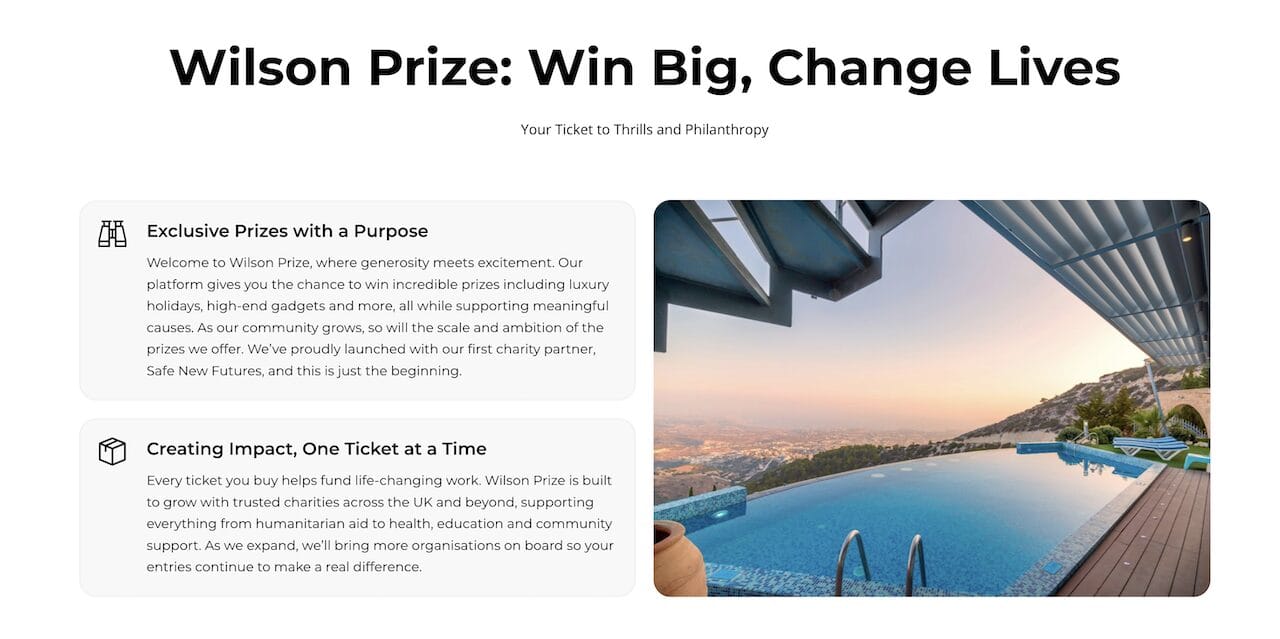
Step 5: Review and Plan for the Future
Once your competition ends, take time to reflect and prepare for the next one.
1. Analyze Results
- Compare ticket sales to your goals.
- Review key metrics like revenue, website traffic, and engagement.
- Identify the most effective marketing channels.
2. Gather Insights
- Understand your audience by analyzing demographics and behavior.
- Note which strategies performed well and which need improvement.
3. Highlight Success
- Share the winner’s story and thank participants on social media.
- Showcase interesting stats to build excitement for future competitions.
4. Plan Ahead
Use the lessons learned to refine your approach, enhance marketing, and improve user experience for your next competition.
Keep building on each campaign’s success, and you’ll grow a loyal audience ready for the next big prize.
Why is a raffle or competition website a good business model?
Hosting an online raffle offers numerous benefits and serves various purposes, making it an attractive option for organizations, businesses, and individuals alike. Here are some of the key reasons why conducting an online raffle can be advantageous:
1. Accessibility: Online raffles break down geographical barriers, allowing people from all over the world to participate. This accessibility expands your potential participant pool, increasing the chances of reaching a larger audience and generating more revenue or engagement.
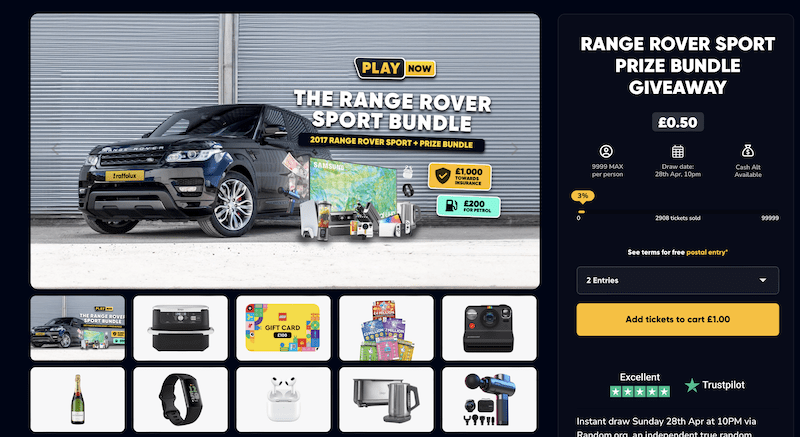
2. Convenience: Participants can enter online raffles from the comfort of their own homes, at any time that suits them. This convenience encourages more people to participate, as they don’t have to go to a physical location or adhere to specific entry hours.
Are you looking to launch your own competition website? We are currenrly selling a pre-built competition which you can buy for £99. This comes with everything you need to start your own competition website. This will save you thounsands in development costs so click here to buy it, make sure you read all the description! You can also buy it here on Gumroad
3. Cost-Effectiveness: Hosting an online raffle can be more cost-effective than traditional offline methods. There’s no need to print physical tickets, rent a venue, or hire staff to manage the event. This cost savings allows you to allocate more resources towards prizes, marketing, or charitable causes.
4. Increased Reach: With the power of digital marketing and social media, online raffles have the potential to reach a wider audience than traditional methods. You can leverage various online channels to promote your raffle and attract participants, including social media platforms, email newsletters, websites, and online communities.
5. Data Collection: Online raffles provide an opportunity to collect valuable data about your participants, including their contact information, demographics, and preferences. This data can help you better understand your audience and tailor your future marketing efforts to reach them more effectively.
6. Fundraising: For charitable organizations, online raffles can be an effective way to raise funds for a cause. By selling raffle tickets online, organizations can reach a larger donor base and generate more donations than traditional fundraising methods.
7. Brand Awareness: Hosting an online raffle can help increase brand awareness and visibility for businesses. By offering attractive prizes and promoting the event across various online channels, businesses can attract new customers, engage with existing ones, and strengthen their brand reputation.
8. Engagement and Community Building: Online raffles can foster a sense of community and engagement among participants. By creating excitement around the event, encouraging social sharing, and providing opportunities for interaction, organizers can build a loyal and engaged audience.
9. Greater chance of winning: The chances of winning competitions are higher than a lottery. Depending on the company doing it, you can almost guarantee your chance of winning is higher simply down to the lower number of people playing. This might make spending £10 on a ticket more appealing to customers. You can find more info about the odds of winning the lottery from the blog post from Health Lottery.
But isn’t online raffle gambling? Are competition websites legal?
According to UK law Online raffles and competitions are not gambling. These types of websites and apps are still fairly new so there isn’t the same level of laws compared to gambling.‘ Prize Competitions’ is the official terminology used by The Gambling Commission.
You can also read more about staying legal via the Free Draw page on the gambling commission website here.
If you are looking for some more information about illegal lotteries, PWC has a great article about this, Illegal raffles and lotteries in the United Kingdom
What are the legal requirements for running a competition site?
Running your own competition website is straightforward, and with a few guidelines, it doesn’t require any special licensing.
Do I need a license to run a competition website?
Prize competitions and free draws are exempt from regulation under the Gambling Act 2005, meaning they don’t require a license. These competitions can be held for commercial or personal purposes, allowing you to offer prizes or promote a product in a fun, engaging way without the need for licensing.
What is a prize competition?
A true prize competition is one where winners are chosen based on skill, judgment, or knowledge. Under the Gambling Act, a legitimate prize competition requires that the skill, knowledge, or judgment involved should either:
- Discourage a significant number of potential entrants from participating, or
- Prevent a substantial number of entrants from winning a prize.
By including a qualifying question related to the prize, you ensure that participants must possess a certain level of knowledge or judgment. Alternatively, you can provide a free entry option to meet these requirements.

How do you structure a competition to meet the ‘skill’ requirement?
To satisfy the skill test, you must reasonably expect that the level of skill, judgment, or knowledge required will either:
- Deter a significant portion of potential participants from entering, or
- Prevent a considerable number of entrants from winning a prize.
The necessary level of skill or knowledge depends on your target audience. If the questions are too simple and fail to discourage enough participants or eliminate a substantial number of entrants, the skill test won’t be met. In this case, you’ll need to increase the skill level (keeping records to justify your reasoning) or ensure the competition is free to enter.
How should I set up the multiple-choice question?
For competitions using multiple-choice questions, the Gambling Commission advises that there should be enough credible alternative answers and that the correct answer should not be placed too close to the question itself. The required level of skill or knowledge will vary based on the target audience.
How do I ensure there is a free entry route?
Even if a competition includes a paid entry route, it will be considered free to enter if there is an alternative free route, provided that:
- The alternative entry method, such as sending a letter by regular post or using another communication method without payment, is just as convenient as the paid route.
- The free entry route is clearly displayed in an equally prominent and understandable position.
- The prize allocation system treats all entries equally, without discrimination between paid and free routes, and both are entered into the same winner selection process.
If you’re unsure whether your competition meets the skill test, you can ensure it falls outside the scope of the Gambling Act by offering a free entry option or, if payment is required, by providing an alternative free route that is well-advertised. A competition that fails the skill test can still be outside the Gambling Act’s remit if:
- No payment is required to enter, including to find out if you’ve won or to collect a prize, or
- There is a clearly available free entry route.
The Gambling Act defines ‘payment’ to include not just money, but anything of value, such as paying extra for a product to enter or using premium rate phone numbers, including when paying more for a promotional product compared to a non-promotional one.
PLEASE NOTE – The advice provided above is for informational purposes only. While we have conducted research, we recommend that you carry out your own research and/or consult with a legal professional.
What is the difference between the lottery and an online competition?
Most people have played the lottery at some point in their lives, you buy a ticket at your super market or online, numbers are then randomly chosen and a winner is chosen based on the numbers they picked. Lottery is a form of gambling, there are three aspects to this which make it so:
- Payment
- One or more prizes are won
- Prizes are awarded by random chance
If you had an online raffle or competition which had those three areas then it would be gambling and thus, illegal.

How do you make a competition or raffle website legal and not gambling?
There is a pretty sneaky workaround for this, which all online raffles or competitions must use.
Skill based questions
For an online raffle to be legal, the Gambling Commission states that..
“competitions that genuinely rely on skill, judgment or knowledge are to be permitted to operate free of any regulatory control under the Gambling Act 2005”,
Many websites got around this by asking very similar questions that everyone knows the answer to, however, the Gambling Commission states…
“there are some competitions that ask just one simple question, the answer to which is widely and commonly known or is blatantly obvious from the material accompanying the competition. The Commission considers that these do not meet the test in the Act.”
In fact, it is stated in the Gambling Act 2005 that the skill-based question should be difficult enough to..
“Deter a significant proportion of those who wish to enter from doing so, or. Prevent a significant proportion of those who do enter from winning a prize”
So in order for your competition website to be legal, the questions need to be somewhat difficult. But the level of difficulty is always up for debate.
Free entries
If your question on your competition website is too easy then the other way to make sure it’s legal is to make the entrees free.
The Gambling Commission states:-
“if a competition organiser establishes two equally prominent and convenient methods of paying for entry and one costs less than the other, that is sufficient for the competition to meet the requirement.”
You can add a free way to enter as well as paid options, but the free route must be treated in the same way as the paid route. This means someone with a free ticket must have an equal chance of winning compared to the paid participant. The same maximum entries for both free and paid too.
How to make a competition or raffle website
Before we go through the list, make sure that your website is legally viable, and make sure you look into the laws regarding your raffle website before launching it.
Step 1: Define Your Goals
Before you start building your website, it’s essential to clearly define your goals. Are you looking to raise funds for a charity or organization? Do you want to increase brand awareness or drive traffic to your site? Understanding your objectives will help you tailor your website design and marketing strategy accordingly.
Step 2: Choose a Platform
There are several platforms available for creating raffle or competition websites, ranging from DIY website builders to custom development. Popular options include WordPress with plugins like RafflePress or WooCommerce, dedicated raffle platforms like Rafflecopter or Raffall, or custom development using web development frameworks like Django or Ruby on Rails. Choose a platform that aligns with your technical skills and budget.
We recommend RafflePress because we often use WordPress to make websites. This is a great platform to start a competition or raffle website because the plugin is quick and easy to set up. It also has great features which allow the users to get more entries by sharing the competition on their social platforms like Facebook and Twitter, and you can also get more entries if they visit, subscribe and take other actions on YouTube. It’s the perfect way to share and make your competition go viral.
Step 3: Design Your Website
The design of your website plays a crucial role in attracting participants and encouraging them to enter your raffle or competition. Ensure that your website is visually appealing, easy to navigate, and mobile-friendly. Use high-quality images and clear, concise copy to communicate the details of your event and the prizes on offer.
In order to get a great looking websites it’s important to put the research in. Try and find some websites you like the look of, and if you are struggling try looking on Behance or Dribble. This is where web designers like us submit their designs.
Step 4: Set Up Registration and Payment Processing
Make it easy for participants to register for your raffle or competition and purchase tickets or entries. Implement a user-friendly registration process with clear instructions and minimal friction. Integrate secure payment processing to accept payments online, ensuring the safety of your participants’ financial information.
Many of the Raffle plugins and software options have their own registration and payment integration. We would recommend using something like Stripe or Paypal as they are the most accessible. However many competition websites do not allow a standard payment gateway, so Stripe and Paypal may not be an option for you. The most popular payment gateway for competition/raffle websites is Cashflows, you are required to sign up for this, pay their fee and send over various documents like ID, proof of address and others. Make sure you take this into consideration when you budget for your competition website.
Step 5: Promote Your Website
Once your website is live, it’s time to promote your raffle or competition to attract participants. Utilize a mix of digital marketing channels, including social media, email marketing, influencer partnerships, and paid advertising, to reach your target audience. Highlight the unique features of your event and the exciting prizes on offer to entice people to participate.
Step 6: Manage Your Event
Throughout the duration of your raffle or competition, it’s essential to actively manage and promote your event to maintain momentum and engagement. Regularly update your website and social media channels with countdowns, winner announcements, and behind-the-scenes content to keep participants excited and informed.
Step 7: Follow Up
After your raffle or competition has ended, take the time to follow up with participants and winners. Thank everyone who participated, whether they won or not, and collect feedback to improve future events. Make sure to deliver prizes promptly and professionally to maintain a positive relationship with your audience.
How much does a raffle or competition website cost to develop?
At Developer Rocket, we aim to keep our prices as fair as possible, we price our services based on how long it takes us. In the past, we have charged between £1899 and £3000 for a fully ready competition website. If you have your designs, branding and content ready, it can help reduce this price because it’s less work for us!
Get in touch below for a quote from us, this form goes straight to our inbox so we’ll reply when we can, thanks!
Create a raffle website or competition website
Creating a raffle or competition website can be a rewarding way to engage your audience, raise funds, or increase brand awareness. By following these steps and leveraging the right tools and strategies, you can create a successful event that captures the attention of your target audience and drives results for your organisation or business.
If you are looking for help in developing your competition or raffle website, get in touch with us at Developer Rocket today!


